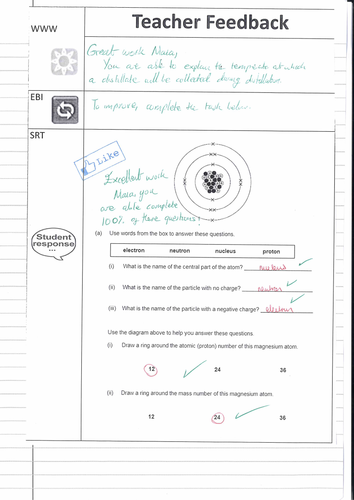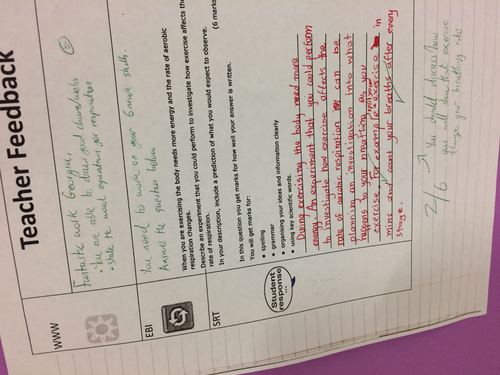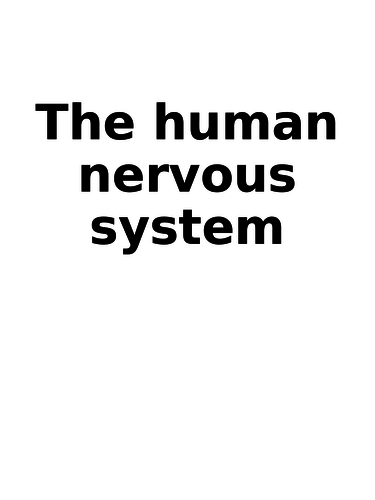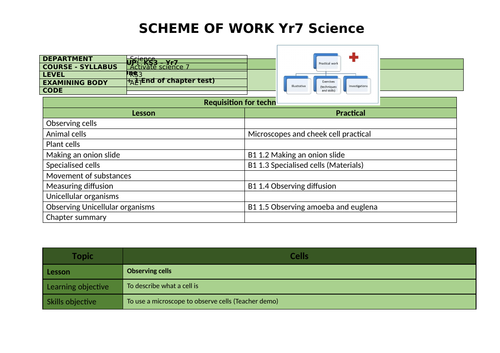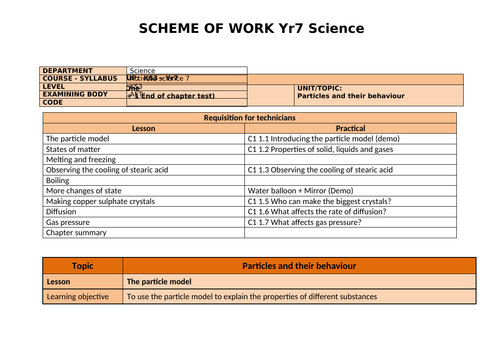243Uploads
103k+Views
54k+Downloads
All resources

C2.5 Explaining trends
AQA GCSE Sciences (9-1)
Chemistry: C2 The periodic table
Lesson 5: C2.5 Explaining trends
Based on the Kerboodle Resources
The AQA Kerboodle worksheet are not included so as to be acting within the TES code of conduct.

C2.1 Development of the periodic table
AQA GCSE Sciences (9-1)
Chemistry: C2 The periodic table
Lesson 1: C2.1 Development of the periodic table
Based on the Kerboodle Resources
The AQA Kerboodle worksheet are not included so as to be acting within the TES code of conduct.

KS4 Physics 1 Marking and Feedback Exam questions with Answers (Formative assessment)
I’ve uploaded an image of the finished product.
This should be used ideally as a formative assessment before the summative assessment.
The teacher (using your school’s designated colour) writes a WWW and relates the EBI to one of the tasks.
The student completes the task using their designated feedback pen.
The teacher follows up and marks the work with comments on how to improve.
Since each unit has four different questions of various abilities, you can also differentiate.
This pack is for Physics 1 and included 4 question sheet for these units:
P1 Conservation and dissipation of energy
P2 Energy transfer by heating
P3 Energy resources
P4 Electric circuits
P5 Electricity in the home
P6 Molecules and matter
P7 Radioactivity

KS4 Physics 2 Marking and Feedback Exam questions with Answers (Formative assessment)
I’ve uploaded an image of the finished product.
This should be used ideally as a formative assessment before the summative assessment.
The teacher (using your school’s designated colour) writes a WWW and relates the EBI to one of the tasks.
The student completes the task using their designated feedback pen.
The teacher follows up and marks the work with comments on how to improve.
Since each unit has four different questions of various abilities, you can also differentiate.
P8 Forces in balance
P9 Motion
P10 Force and motion
P12 Wave properties
P13 Electromagnetic waves
P15 Electromagnetism

KS4 Biology 1 Marking and Feedback Exam questions with Answers (Formative assessment)
I’ve uploaded an image of the finished product.
This should be used ideally as a formative assessment before the summative assessment.
The teacher (using your school’s designated colour) writes a WWW and relates the EBI to one of the tasks.
The student completes the task using their designated feedback pen.
The teacher follows up and marks the work with comments on how to improve.
Since each unit has four different questions of various abilities, you can also differentiate.
This pack is for Biology 1 and included 4 question sheet for these units:
B1 Cell structure
B2 Cell division
B3 Digestion
B4 Organising plants and animals
B5 Communicable diseases
B6 Preventing and treating diseases
B7 Non-communicable diseases
B8 Photosynthesis
B9 Respiration

KS4 Biology 2 Marking and Feedback Exam questions with Answers (Formative assessment)
I’ve uploaded an image of the finished product.
This should be used ideally as a formative assessment before the summative assessment.
The teacher (using your school’s designated colour) writes a WWW and relates the EBI to one of the tasks.
The student completes the task using their designated feedback pen.
The teacher follows up and marks the work with comments on how to improve.
Since each unit has four different questions of various abilities, you can also differentiate.
This pack is for Biology 2 and included 4 question sheet for these units:
B10 The Human nervous system
B11 Hormonal coordination
B13 Reproduction
B14 Variation and evolution
B15 Genetics and evolution
B16 Adaptations, interdependence and competition
B17 Organising an ecosystem
B18 Biodiversity and ecosystems

Yr7 Cells Scheme of Work Kerboodle Activate 1 (SoW)
Content
Lesson objective
Skills objective
Learning outcomes
Keywords
Numeracy
Practical
Homework
Misconceptions
Key questions to ask
Lesson plans:
Observing cells
Animal Cells (Practical)
Plant cells
Making an onion slide (Practical)
Specialised cells (Practical)
Movement of substances
Measuring diffusion (Practical)
Unicellular organisms
Observing Unicellular Organisms (Practical)
Chapter Summary

Yr7 Particles. Scheme of Work for Kerboodle Activate 1 (SoW)
Content
Lesson objective
Skills objective
Learning outcomes
Keywords
Numeracy
Practical
Homework
Misconceptions
Key questions to ask
Lesson plans:
The particle model (Practical)
States of matter (Practical)
Melting and freezing
Observing the cooling of stearic acid (Practical)
Boiling
More changes of state (Practical)
Making copper sulphate crystals (Practical)
Diffusion (Practical)
Gas pressure (Practical)
Chapter summary

P3.1 Energy Demands
AQA GCSE Sciences (9-1)
Physics: P3 Energy Resources
Lesson 1: P3.1 Energy Demands
Based on the Kerboodle Resources
The AQA Kerboodle worksheet are not included so as to be acting within the TES code of conduct.

P1.1 Changes in energy stores
AQA GCSE Sciences (9-1)
Physics: P1 Conservation and dissipation of energy
Lesson 1: P1.1 Changes in energy stores
Based on the Kerboodle Resources
The AQA Kerboodle worksheet are not included so as to be acting within the TES code of conduct.

Atomic Theory
In this lesson, learners will learn about the billiard ball model, plum pudding model, nuclear model and Bohr model of the atom.
They will also learn the contribution of James Chadwick and how to distinguish the different sub-atomic particles.

J J Thomson & Plum Pudding Model
Learners will discover how JJ Thomson came up with his Plum Pudding Model and will also see how Millikan discovered the charge of the electron.

Rutherford & The Nuclear Model
In this lesson, learners discover how Rutherford and his students deduced the nuclear model from the alpha scattering experiement.



